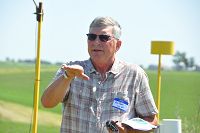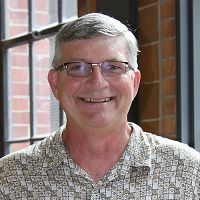Clear Creek Watershed Bus Tour
On June 4, 2016, the City of Coralville and the Johnson County Soil and Water Conservation District hosted a bus tour of the Clear Creek Watershed, one of three watersheds studied within the Intensively Managed Landscapes region of the Critical Zone Observatory (IML-CZO).
The Clear Creek Watershed encompasses a 270 square-kilometer area in East Central Iowa. Clear Creek eventually drains into the Iowa River in Coralville, just west of the University of Iowa campus. Similar to many Midwestern watersheds, much of the land within the Clear Creek Watershed is devoted to agriculture.
The bus tour started with a stop at the Maas Family farm in eastern Iowa County. Investigators with the IML-CZO along with researchers at the University of Iowa have used the site as an opportunity to study weather patterns, soil quality, and other factors within the watershed.
Dr. Art Bettis, Clear Creek Site Coordinator for the IML-CZO, said this is the third year research has taken place at the Maas Family Farm.
“We’re able to look at how water, energy, and carbon are moving through the landscape from the surface up high on the landscape down the slopes into the floodplain and also in the subsurface,” said Dr. Bettis. “That’s really one of the main thrusts of our research in this IML-CZO as far as linking the surface processes that are taking place – erosion, water infiltration, weather patterns – with what’s going on deep and then how that all affects the surface waters and the shallow ground water.”
The tour stopped for lunch at F.W. Kent Park in western Johnson County. The Johnson County Cattlemen’s Association and H.R. Green provided steak sandwiches, potato salad, fruit, and cookies while Brad Freidhof, Conservation Program Manager for Johnson County, presented on conservation efforts within the park and other parts of the watershed.
At the center of the 1,052-acre park is a 27-acre lake which provides a source of recreation for park-goers, however, sediment and nutrient runoff has threatened the recreational utility of the lake which has forced Freidhof and other officials to address the issue.
“Iowa is an agricultural state and a state with fertile soils. These facts can’t be changed, but land managers must address those issues,” said Freidhof. “At F.W. Kent Park the best management practices to reduce sediments and nutrients had run the life of their designs. So the county will be restoring and adding additional best management practices – such as stormwater and sediment basins – to help restore that function to the watershed.”
Additionally, Freidhof said park officials are looking at urban stormwater management practices to improve water quality in the lake.
“Building a park creates hard surfaces and those hard surfaces are not the best for water quality. Hard surfaces direct water into the lake with little or no treatment so the county is identifying urban storm water practices to reduce the impacts of this issue. These may include bioswales, or simply contouring the land to direct the water away from the lake into a treatment area to infiltrate the water,” Freidhof said.
Lastly, county officials are working on “timber stand improvement” (TSI) projects throughout the park. More than a quarter million trees have been planted in the park since 1970 but Freidhof said the abundance of trees is now leading to soil erosion, degraded water quality, and other issues.
“At the time there was little thought into the long term impacts of these dense tree plantings. Some of the plantings, where correctly managed and thinned, provided a scatter forest with a healthy herbaceous layer on the forest floor. Many, however, were never revisited due to lack of funds or staff to do the necessary management,” said Freidhof. “This led to dense woodlands which shaded the herbaceous layer and reduced or eliminated it completely. Many of the sites planted to trees had lighter, sandy soils. Without the needed herbaceous layer many of these soils began to rapidly erode and these eroding soils carried nutrients to the lake, which brought us to our current conditions.”
Freidhof also briefly discussed the county’s stream back restoration project along the Clear Creek Trail. He said he expects the recent acquisition of two parcels of land along the trail will be helpful in the county’s efforts to improvement bank stability and water quality.
The final stop of the tour was at the Coral Ridge Stormwater Project on the west side of Coralville. The project is a collaboration of various city, county, and state governmental and academic agencies as well as private engineering firms. The project utilizes bioswales which help rainwater to infiltrate the ground during small storms while also serving as an effective way to convey stormwater during larger rains.
Rai Tokuhisa, a master’s student in hydraulics and water resources engineering at the University of Iowa, discussed her efforts on the project during the bus tour which has become a major component to her master’s research.
“I came out earlier in the spring and put in these instruments. There’s a weir so that I have controlled flow and pressure transducers recording the depth so that I can turn those depths into a flow rate. I also have electric conductivity meters and those measure how electrons move in the water,” she said.
Tokuhisa – who studied civil and environmental engineering as an undergraduate at the University of Iowa – said her interest in this particular field came from her passion to serve the public.
“My motivation really is to serve the people that I live with, my community. As mushy as that sounds, it’s really rewarding for me,” said Tokuhisa. “Further in my career I’d like to be consulting so I can see whatever designs or suggestions that I come up with put into practice. To be able to drive by a best management practice and be like ‘I helped to design that!’ But, moreover, to also know that everyone downstream of that best management practice is somehow benefiting.”
Event organizers such as Dr. Bettis felt that the inaugural bus tour was successful, particularly with bringing the urban and rural sectors together to address issues that affect everyone.
“I got several great comments from both farmers as well as people living in the urban settings that say they thought it was really cool that they’d never been to these other places and talked about these issues. They had all these commonalities that were being addressed in different sorts of ways but in some cases in the same ways in the feeling that it’s all one basin that is all linked together whether you’re in an urban or rural setting. That’s one of the things with the IML-CZO, our focus is primarily on the agricultural use of the landscape but we also look at environmental gradients and one of the environmental gradients we have on this CZO is a rural to urban gradient,” Dr. Bettis said.
Dr. Bettis added that while the IML-CZO is not funding the Coral Ridge Avenue project, the IML-CZO has been studying and utilizing data from the project since it falls within the Clear Creek Watershed. He said that he hopes to use this research coupled with the success of the first bus tour to host similar events in the future.
“I think another bus tour like this would be great. I think it’d be really nice to have it at the end of the five-year project where we have more data and more time to actually analyze data and have results that we can really talk about in more detail," said Dr. Bettis. "I think it would be a good contrast and comparison of what we knew then, where we are now, and where we’re going with the information we’ve gathered.”
By Nick Fetty (Journalism, University of Iowa)
News Category:
EDUCATION/OUTREACH
Photos
Clear Creek Watershed Bus Tour

Dr. Art Bettis (Clear Creek Site Coordinator for the IML-CZO) presents during a stop at an Iowa County farm on the Clear Creek Watershed Bus Tour. June 4, 2016. Photo: Nick Fetty (Center for Global and Regional Environmental Research, University of Iowa)

Dr. Art Bettis (Clear Creek Site Coordinator for the IML-CZO) presents during a stop at an Iowa County farm on the Clear Creek Watershed Bus Tour. June 4, 2016. Photo: Nick Fetty (Center for Global and Regional Environmental Research, University of Iowa)

Dr. Art Bettis (Clear Creek Site Coordinator for the IML-CZO) presents during a stop at an Iowa County farm on the Clear Creek Watershed Bus Tour. June 4, 2016. Photo: Nick Fetty (Center for Global and Regional Environmental Research, University of Iowa)

The Johnson County Cattlemen's Association provided streak sandwiches for lunch during a stop at F.W. Kent County Park on the Clear Creek Watershed Bus Tour. June 4, 2016. Photo: Nick Fetty (Center for Global and Regional Environmental Research, University of Iowa)

The Johnson County Cattlemen's Association provided streak sandwiches for lunch during a stop at F.W. Kent County Park on the Clear Creek Watershed Bus Tour. June 4, 2016. Photo: Nick Fetty (Center for Global and Regional Environmental Research, University of Iowa)

The Johnson County Cattlemen's Association provided streak sandwiches for lunch during a stop at F.W. Kent County Park on the Clear Creek Watershed Bus Tour. June 4, 2016. Photo: Nick Fetty (Center for Global and Regional Environmental Research, University of Iowa)

Kate Giannini (Soil & Water Conservation Specialist for the Johnson County Soil & Water Conservation District) presents during the Clear Creek Watershed Bus Tour. June 4, 2016. Photo: Nick Fetty (Center for Global and Regional Environmental Research, University of Iowa)

A sign for the Coral Ridge Avenue Stormwater Project in Coralville. June 4, 2016. Photo: Nick Fetty (Center for Global and Regional Environmental Research, University of Iowa)

Dr. Art Bettis (Clear Creek Site Coordinator for the IML-CZO) presents during a stop at an Iowa County farm on the Clear Creek Watershed Bus Tour while Eric Dickerson (Telecommunications Production Coordinator for the City of Coralville) shoots video. June 4, 2016. Photo: Nick Fetty (Center for Global and Regional Environmental Research, University of Iowa)

Mike Carberry (Johnson County Supervisor) listens to Dr. Art Bettis (Clear Creek Site Coordinator) as he presents during the Clear Creek Watershed Bus Tour. June 4, 2016. Photo: Nick Fetty (Center for Global and Regional Environmental Research, University of Iowa)

Attendees listen as Dr. Art Bettis (Clear Creek Site Coordinator for the IML-CZO) presents during the Clear Creek Watershed Bus Tour. June 4, 2016. Photo: Nick Fetty (Center for Global and Regional Environmental Research, University of Iowa)

Stewart Maas discusses conservatoin efforts on the Maas Family Farm during the Clear Creek Bus Tour. June 4, 2016. Nick Fetty (Center for Global and Regional Environmental Research, University of Iowa)

Stewart Maas discusses conservatoin efforts on the Maas Family Farm during the Clear Creek Bus Tour. June 4, 2016. Nick Fetty (Center for Global and Regional Environmental Research, University of Iowa)

Brad Friedhof (Conservation Program Manager for Johnson County) listens to a presentation at the Maas Family Farm during the Clear Creek Bus Tour. June 4, 2016. Nick Fetty (Center for Global and Regional Environmental Research, University of Iowa)

The north fork of Clear Creek. June 4, 2016. Nick Fetty (Center for Global and Regional Environmental Research, University of Iowa)

Attendees listen as Dr. Art Bettis (Clear Creek Site Coordinator for the IML-CZO) presents during the Clear Creek Bus Tour. June 4, 2016. Nick Fetty (Center for Global and Regional Environmental Research, University of Iowa)

Attendees listen as Dr. Art Bettis (Clear Creek Site Coordinator for the IML-CZO) presents during the Clear Creek Bus Tour. June 4, 2016. Nick Fetty (Center for Global and Regional Environmental Research, University of Iowa)

Aaron Gwinnup (Surface Water Engineer for H.R. Green) presents during the Clear Creek Bus Tour. June 4, 2016. Nick Fetty (Center for Global and Regional Environmental Research, University of Iowa)

Rai Tokuhisa (Master's Student, Hydraulics and Water Resources Engineering) discusses the Coral Ridge Avenue Stormwater Project during the Clear Creek Bus Tour. June 4, 2016. Nick Fetty (Center for Global and Regional Environmental Research, University of Iowa)

Rai Tokuhisa (Master's Student, Hydraulics and Water Resources Engineering) discusses the Coral Ridge Avenue Stormwater Project during the Clear Creek Bus Tour. June 4, 2016. Nick Fetty (Center for Global and Regional Environmental Research, University of Iowa)

Pat Harney (Johnson County Supervisor), left, and others listen as Rai Tokuhisa (Surface Water Engineer for H.R. Green) discusses the Coral Ridge Avenue Stormwater Project during the Clear Creek Bus Tour. June 4, 2016. Nick Fetty (Center for Global and Regional Environmental Research, University of Iowa)

Brad Friedhof (Conservation Program Manager for Johnson County) asks a question about the Coral Ridge Avenue Stormwater Project during the Clear Creek Bus Tour. June 4, 2016. Nick Fetty (Center for Global and Regional Environmental Research, University of Iowa)

Aaron Gwinnup (Surface Water Engineer for H.R. Green) asks a question about the Coral Ridge Avenue Stormwater Project during the Clear Creek Bus Tour. June 4, 2016. Nick Fetty (Center for Global and Regional Environmental Research, University of Iowa)

Amy Foster (Stormwater Coordinator for the City of Coralville Engineering Department) discusses the Coral Ridge Avenue Stormwater Project during the Clear Creek Bus Tour. June 4, 2016. Nick Fetty (Center for Global and Regional Environmental Research, University of Iowa)
On June 4, 2016, representatives from the IML-CZO, the University of Iowa, state and local government, and others took a bus tour of the Clear Creek Watershed in Eastern Iowa.
People Involved
CZO
-
IML, INVESTIGATOR
-
IML, GRAD STUDENT
-
IML, GRAD STUDENT
Explore Further





